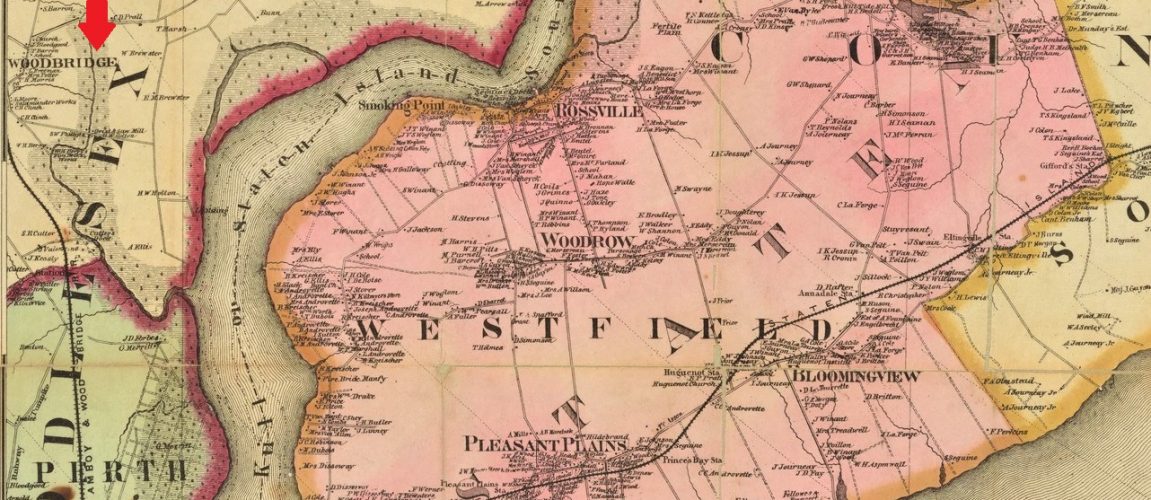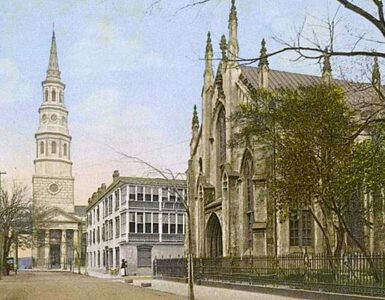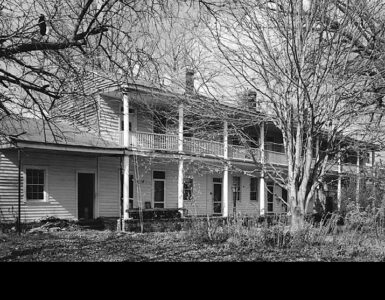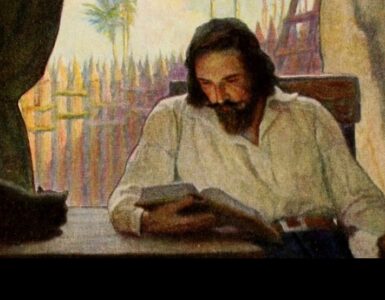 Azel was born at Setauket Long Island, New York, February 20, 1738. Azel’s father was named John and he owned a good deal of property; his mother was Joanna (Miller) the widow of Thomas Helme of Miller’s Place, New York. Azel graduated the College of New Jersey (Princeton) in 1756, then studied Theology with Caleb Smith of Newark Mountain, New Jersey. Smith had been a tutor at Princeton and was at the time a college trustee. Roe was licensed to preach the gospel by New York Presbytery around 1760, and two years later he was ordained sine titulo (without call to a particular church) by the same presbytery. After preaching for some time in the church in Woodbridge, New Jersey, the congregation issued a call, which he accepted and was then installed the fall of 1763. It appears that the only church he was ever a candidate for was Woodbridge.
Azel was born at Setauket Long Island, New York, February 20, 1738. Azel’s father was named John and he owned a good deal of property; his mother was Joanna (Miller) the widow of Thomas Helme of Miller’s Place, New York. Azel graduated the College of New Jersey (Princeton) in 1756, then studied Theology with Caleb Smith of Newark Mountain, New Jersey. Smith had been a tutor at Princeton and was at the time a college trustee. Roe was licensed to preach the gospel by New York Presbytery around 1760, and two years later he was ordained sine titulo (without call to a particular church) by the same presbytery. After preaching for some time in the church in Woodbridge, New Jersey, the congregation issued a call, which he accepted and was then installed the fall of 1763. It appears that the only church he was ever a candidate for was Woodbridge.
Shortly after Roe began his Woodbridge ministry, he started visiting Metuchen (about five miles away) to hold services with a group that wanted to form a church. On August 5, 1767, the Metuchen congregation effectively became a second campus of the Woodbridge Church. Roe was the minister for both locations with the session of Woodbridge governing Metuchen in what was effectively, though not specifically said to be, a collegiate arrangement. About 1790, the Woodbridge Church became uneasy with the situation because Roe was unable to find sufficient time to minister to his original flock. The church wanted to be separated from Metuchen so Roe could be its minister exclusively; Metuchen opposed the division. The Metuchen congregation contested the separation before presbytery several times, but Woodbridge persevered and it was finally achieved. However, another part of the issue between the two locations involved property. When the village of Woodbridge was established its founders gave 200 acres of land to the church. The Metuchen congregation claimed some rights not only to the acreage but also the manse. Unfortunately, the case was brought to court to achieve resolution.
During the Revolutionary War Roe was a dedicated supporter of independence. Woodbridge is just a short distance into New Jersey across the sound from Staten Island. British troops were encamped on Staten Island, so they sometimes sent raiding parties into New Jersey to plunder and disrupt the towns, including Woodbridge. Roe’s support of independence came forth in speeches and encouragement to the troops in their fight against Britain. One night Tories and British troops seized him at home to carry him off to New York for imprisonment in Sugar House Prison. In the course of the trip, they had to ford a small stream. The British officer in command insisted that he carry Roe across the water on his back. When they were midstream, Roe said to the officer, “Well, Sir, if never before, you can say, after this, that you were once priest-ridden.” The officer was so overcome by laughter, that he stumbled and nearly fell with Roe into the water. The hilarity of Roe’s comment must have had particular significance in the day, but it makes for a good story (possibly an apocryphal one). He was able to return home in a prisoner exchange. Shortly after this unsettling event he moved the family to Piscataway (ten miles west of Woodbridge), but, after the war, he returned to the parsonage at Woodbridge.
His first marriage was to Rebecca (Foote) Smith, who was the widow of his theological tutor, Caleb Smith. Azel and Rebecca were blessed with two sons and six daughters before she passed away September 1, 1794. On Christmas Eve 1796, he married Hanna Bostwick who was the daughter of the pastor of First Church, New York, David Bostwick. Azel was Hannah’s third husband in an era when men often had more than one wife due to mothers dying from child delivery, but women having multiple husbands was not so common. November 1815, Hanna contracted “lung fever”(possibly pneumonia) and died after a few days of illness at the age of sixty seven at the end of the month. The loss felt by Azel may have contributed to his own death just four days later caused by a disease afflicting his throat.
The information about Roe’s ministry is limited, but in terms of his calling, he served the Woodbridge Presbyterian Church for fifty-three years. It was his only call. The limited information given in this biography is due somewhat to there being no session minutes available for the first twenty-eight years of his ministry. He was a trustee of the College of New Jersey 1778-1807, and he was honored with the Doctor of Divinity by Yale in 1800. No publications by Roe were located, but the Presbyterian Historical Society in Philadelphia has a manuscript journal for November 10-24, 1815, which likely includes Roe’s thoughts as his wife suffered till death. Roe was a commissioner to the first General Assembly of the Presbyterian Church in 1789 and he was the moderator of the fourteenth General Assembly in 1802. Roe’s close friend and ministry associate John McDowell conducted the funeral services for both spouses and commented on their deaths.
You are doubtless aware of the remarkable proximity of Dr. Roe’s death to that of his wife. I preached her funeral sermon on the 29th of November, 1815, and his on the 3rd of December following,—there being an interval of only four days. My text at his funeral was—”The memory of the just is blessed”—a sentiment which I am persuaded was heartily responded to, in its application to that honored servant of God, by all who knew him.
Azel and Hannah are buried in the old cemetery of the First Presbyterian Church of Woodbridge.
This account of the life of Azel Roe will be concluded with a brief summary of the General Assembly he moderated. The General Assembly of the Presbyterian Church in the United States of America convened for its fourteenth gathering at eleven in the morning Thursday, May 20, 1802, in First Presbyterian Church, Philadelphia. Following retiring moderator Nathaniel Irwin’s sermon from Luke 14:23, “Compel them to come in,” and other opening necessities, Azel Roe was elected moderator. Some of the business transacted was administrative including institution of the office of permanent recording clerk with a daily wage during sessions of 3.00, and the humble but busy temporary clerk would continue to be elected at each Assembly and paid a dollar a day. Judicial issues included that of David Austin who was the minister that caused dissension during the ministries of John McDowell and Henry Kollock in Elizabethtown, New Jersey. Austin was hoping to be restored to the Presbyterian ministry. The assembly resolved that the proper way to achieve restoration would be through the Presbytery of New York from which he withdrew of his own will. It appears he was trying to get around presbytery because he had made no formal complaint against the presbytery but instead sought resolution through the Assembly. An issue that had reoccurred often since the earliest days of American Presbyterianism was application of the Westminster Confession of Faith, 24:4 to marriages of consanguinity and affinity, and one came before Moderator Roe inquiring whether a man and his wife, who in this case was his niece, should be admitted to privileges at the Westminster Presbyterian Church in Jefferson County, Tennessee. The case is particularly interesting because the assembly initially resolved that such matters should be left to the wisdom of local sessions because they would know the situation best, but later the assembly reconsidered the case and referred to a decision of 1797 which was quoted in the 1802 minutes.
That although the Assembly would wish to discountenance imprudent marriages, or such as tend in any way to give uneasiness to serious persons, yet it is their opinion that the marriage referred to is not of such a nature as to render it necessary to exclude the parties from the privileges of the church. (p. 252, Minutes, collection vol., 1789-1820)
It is a case of the Assembly giving a definitive answer to the inquiry while maintaining consistency with judicial precedents, but it would have been nice if the 1797 resolution had been edited in 1802 to include the importance of the local session’s familiarity with individual situations. Another ministry addressed at the assembly was missions. It was the practice then for missionaries funded by the Assembly to provide a full written report and oral account of their work accomplished the previous year. One report given in 1802 was by James Hall regarding his mission to the Mississippi Territory which had lasted over seven months. Hall emphasized the importance of sending more missionaries and he was paid eighty-six dollars. As was often the case in the early years of the Assembly, there was some debate of Psalmody with the subject this time being Isaac Watts’s version of the Psalms as revised by Timothy Dwight. The issue was a direct result of the Plan of Union between the PCUSA and the Congregationalist General Association of Connecticut which had been accomplished at the previous General Assembly. In the interest of the newly established but strained unity, the Assembly said, “The said system is hereby cheerfully allowed, in such congregations and churches as may think it for edification.” That is, leave it up to the local churches and avoid making an issue in the Assembly. Another action was indicative of the denomination’s growth. The Synod of Virginia requested division into three synods. The request was granted with one synod maintaining the name Synod of Virginia, the second became the Synod of Pittsburgh, and the last one was designated the Synod of Kentucky. It might seem unusual to take a geographic jump to Pittsburgh and then Kentucky, but the United States developed around pockets of population with Pittsburgh the primary growing major city west of Philadelphia in Pennsylvania and Kentucky was developing beyond the Appalachian Mountains. It was a busy Assembly and Roe must have been worn out. Sessions extended to Tuesday, June 1, for a total of twelve days minus Sabbaths with the last day convening at 6:00 in the morning.
Barry Waugh
Notes—The header shows Woodbridge, New Jersey, on the left indicated by the red arrow, and to the right across Staten Island Sound is Staten Island (some terminology for this area has changed); the section is clipped from a map published in 1864 which is available in the Library of Congress online digital collection. January 4, 2024 Azel’s mother’s name was corrected because a reader of Presbyterians of the Past, Mark Sternberg, provided the identity of her from the source, John Roe of Brookhaven, L.I., New York and Some of His Descendants – A Record of Six Generations, by Clarence Almon Torrey (1941). Sprague’s Annals, vol. 3; Nevin’s Presbyterian Encyclopedia, 1884, (it is a condensation of Sprague); Celebration of the Two Hundred and Twenty-Fifth Anniversary of the First Presbyterian Church Woodbridge, N.J. May 27, 30, and 31, 1900, portrait from this book; Martha Morrow and Edward E. Baker, editors, History First Presbyterian Church Woodbridge, New Jersey 300th Anniversary May 25, 1975, [1975]; and Roe’s brief entry in James McLachlan’s Princetonians, 1748-1768: A Biographical Dictionary, Princeton, 1976.





